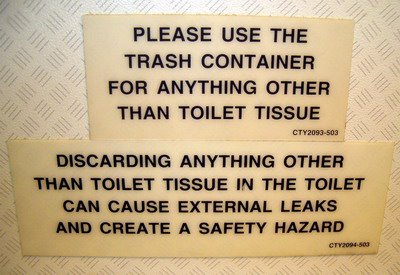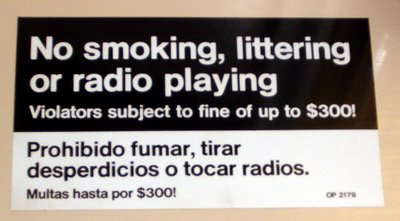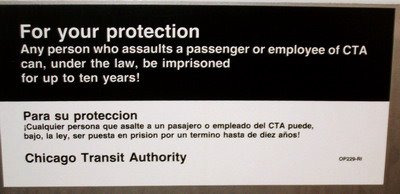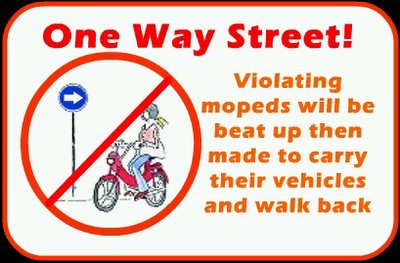Hmm: Respect or Fear?
Sociology is one of the subjects I regret not reading in college. I did have the chance to take an elective in basic sociology, which I passed on in favor of psychology and philosophy. Notwithstanding, I think I can take the liberty of making a few observations from my trip to the USA without having to document my arguments. I'll title these remarks with a "Hmm:" for that was the sound I made at the time. Probably.
Lebanon can be described as lawless by visitors and residents alike. We have laws on the books, practical laws for the most part too. But as a people, we are reluctant to give them any recognition unless we feel they are in our favor OR we are forced to by moral/social pressure. Even the sight of the police does little to discourage a law breaker and signs are mostly vacant placeholders for the latest political poster or graffiti.
So you can imagine my surprise when I saw these:

This was affixed over the toilet bowl inside the lavatory (why are they only called lavatories in planes?!). I was pondering several things at once. First off, they don't mind flushing toilet paper on this airplane, and in fact all public bathrooms in the US don't provide trash bins by the toilets. But I'll leave the toilet practices for another post. What I'm talking about here is the second notice added underneath the first. External leaks and safety hazards? Really? Is such explanation of the mechanics of airplane flush systems necessary? (Nothing keeps a junkie from flushing needles more than external leaks).

Still in the lavatory, the giant smoke alarm fitted overhead had this warning sticker. This is commonly found on most airlines I've flown with and even at some hotels. But only in the US do they seem to quote "Federal Law"! And a specific fine of "$2,200"! (So basically, if I have $2,200 spare change and I'm need of a nicotine fix I can go ahead and light up! All credit cards accepted).

This was hanging inside a subway train car. Again with the monetary fine quote! (Repeated in Spanish of course).

Now this was special! We're talking prison time and it's under the law no less. The apparent message is if that old woman knitting in the corner is getting on your nerves or the train driver gives you a rough ride, subduing your violent instincts to hurt and maim would save you ten years in jail. So, for your own interests don't go hit them now. (Wait till you're off the train then do it).
Basically, the point I'm trying to get to with this post is "Compliance". What makes an average citizen abide by the law? You would hope that basic good civility encourages us to respect laws put in place for our own benefit. And if that fails, there are several punitive measures to keep us in check. You should respect the law of your own accord, and if that is a tough sell, then fear it.
The conclusion that I am left to draw by seeing all these signs (and other experiences during my visit) is this: The law is enforced in the US more by fear and intimidation than anything else.
I even felt this firsthand. The police stationed by the door inside a popular club, the patrol car parked in the dark along a road with a low speed limit, the security cameras in every drugstore. Candid reminders of the trouble you can get into.
I'm not passing judgment nor pointing at any fault in particular. In fact, I think the Lebanese have such callous disregard for the law, instilling some fear can actually be healthy. We can even keep the signs in dollars.
I suggest this one first:

Lebanon can be described as lawless by visitors and residents alike. We have laws on the books, practical laws for the most part too. But as a people, we are reluctant to give them any recognition unless we feel they are in our favor OR we are forced to by moral/social pressure. Even the sight of the police does little to discourage a law breaker and signs are mostly vacant placeholders for the latest political poster or graffiti.
So you can imagine my surprise when I saw these:

This was affixed over the toilet bowl inside the lavatory (why are they only called lavatories in planes?!). I was pondering several things at once. First off, they don't mind flushing toilet paper on this airplane, and in fact all public bathrooms in the US don't provide trash bins by the toilets. But I'll leave the toilet practices for another post. What I'm talking about here is the second notice added underneath the first. External leaks and safety hazards? Really? Is such explanation of the mechanics of airplane flush systems necessary? (Nothing keeps a junkie from flushing needles more than external leaks).

Still in the lavatory, the giant smoke alarm fitted overhead had this warning sticker. This is commonly found on most airlines I've flown with and even at some hotels. But only in the US do they seem to quote "Federal Law"! And a specific fine of "$2,200"! (So basically, if I have $2,200 spare change and I'm need of a nicotine fix I can go ahead and light up! All credit cards accepted).

This was hanging inside a subway train car. Again with the monetary fine quote! (Repeated in Spanish of course).

Now this was special! We're talking prison time and it's under the law no less. The apparent message is if that old woman knitting in the corner is getting on your nerves or the train driver gives you a rough ride, subduing your violent instincts to hurt and maim would save you ten years in jail. So, for your own interests don't go hit them now. (Wait till you're off the train then do it).
Basically, the point I'm trying to get to with this post is "Compliance". What makes an average citizen abide by the law? You would hope that basic good civility encourages us to respect laws put in place for our own benefit. And if that fails, there are several punitive measures to keep us in check. You should respect the law of your own accord, and if that is a tough sell, then fear it.
The conclusion that I am left to draw by seeing all these signs (and other experiences during my visit) is this: The law is enforced in the US more by fear and intimidation than anything else.
I even felt this firsthand. The police stationed by the door inside a popular club, the patrol car parked in the dark along a road with a low speed limit, the security cameras in every drugstore. Candid reminders of the trouble you can get into.
I'm not passing judgment nor pointing at any fault in particular. In fact, I think the Lebanese have such callous disregard for the law, instilling some fear can actually be healthy. We can even keep the signs in dollars.
I suggest this one first:
















6 Comments:
Fear of punishment is certainly an extremely significant effect in these efforts to keep the social order. I’ve been thinking about your points for a while this morning, and I’ve concluded that in my personal, specific case, I’m more motivated to obey a law because it is right rather than because there is a painful punishment. I bring library books back because it might inconvenience someone else who might want the book, rather than the 5 cents a day library fee.
Now, Socrates would strongly disagree with me there, but tough cookies for him. I like my way better =)
That being said, there is certainly a strong role for the fear of punishment in enforcing laws. Definitely agree there. I’ve certainly known a lot of people for whom that was the main thing that kept them from anti-social behavior.
Anyway, as an American learning this ins and outs of Lebanese society, I have been reflecting on the idea that even it a reliable system of punishments and law enforcement were spontaneously installed in Lebanon, it wouldn’t really take. I think there would be a very short period of adjustment, as people engaged in that extraordinary Lebanese skill – getting around the system. Based on what I’ve seen, the key issue in Lebanon isn’t the lack of a law enforcement system, it’s the personal respect for social order. Doing something that helps other people even though it inconveniences you. A kind of “social contract” sort of thing. Examples: Standing in line, yielding in traffic, cutting people off, etc. etc.
I think it’s this respect for the social fabric that is a key difference in why things work differently here. I’ve heard some scholars describe this as “individualism”. As an aside, I’ve noticed that these kinds of individualistic behaviors tend to represent themselves far more in Lebanese people over 30 years old than under. I suspect it has something to do with what that generation had to live through, and the adaptations that implies.
If I’ve drawn the wrong conclusion here, please do blast this theory to bits!
Anyway, this comment is getting far too long, so I’ll just trail off here… =)
I'm posting here as a lowly Brit, and I know for a fact that since our governments continue to kiss USA bums, then we're completely the same way. These signs are on our trains, planes, buses... I'm sure any day trip to London would find plenty of similar fear indusing signage. I guess soceity in general has given up on the idea of people being civil to each other and abiding the law for any particular moral reason... maybe too many people really don't care... it's hard to say. But quite sad all the same.
You want fear, how about the signs at the airports:
Today's Terror Alert Level: Orange
you are totally wrong,
you need more time to make those judgements. I disagree with you, out of personal experience.
Please submit these photos to our site
ATC
Are you into sociology?
千奇百怪
Oh I agree, it would be far better if people followed the law for the pure merits that entails rather than the fear of reprisal. And I agree that while that is usually present to a lesser degree in most societies it seems to be in steep decline here in Lebanon. Hence my call for such signs (I made the last one up). If that doesn't work, nothing will...
Slink
Do you feel that its different in urban vs rural areas? Here in Lebanon the line between the two is blurry and I can't really tell.
Jamal
I didn't see any of those! I wish I had, perfect Kodak moment.
Anon
Ok... I'll go throw myself off a cliff.
Talasim
Copy. Paste. They're yours now...
Post a Comment
<< Home